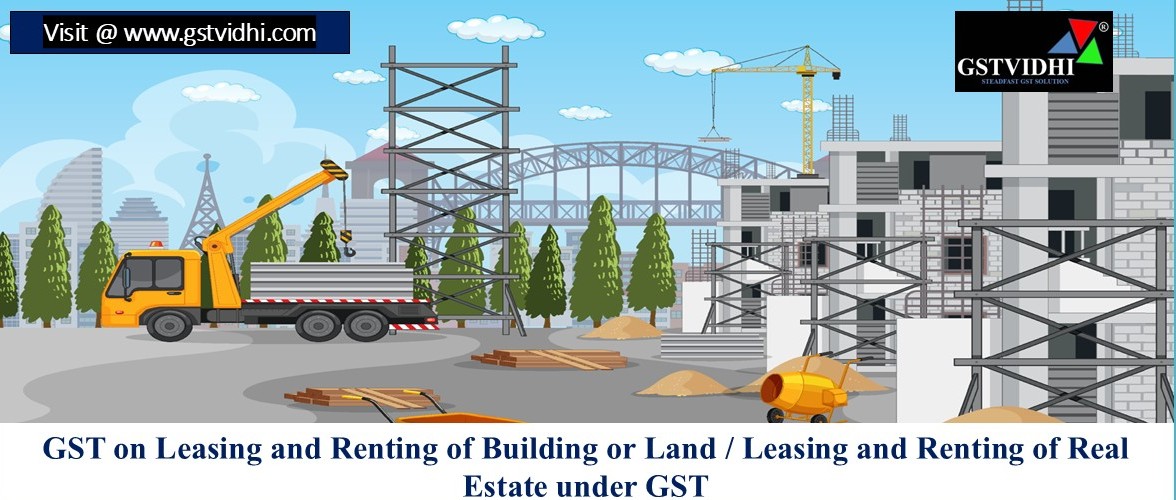
GST on Leasing and Renting of Building or Land / Leasing and
Renting of Real Estate under GST
The Goods and Services
Tax (GST) law treats leasing and renting of land and buildings as a supply
of services. According to Schedule II of the CGST Act, any lease, tenancy,
easement, or license to occupy land is considered a service. Similarly, letting
out commercial, industrial, or residential complexes for business or commerce
also qualifies as a service under GST.
Leasing of Residential
Buildings
If a residential building
is leased for business purposes, it is taxable under GST. However,
leasing of a residential building for non-business purposes (mainly
personal use) is exempt from GST. Before July 18, 2022, renting
residential properties for living purposes was exempt from GST. This exemption
applied to all tenants, whether they were registered or not. The focus was on
the use of the property for residence.
However, the 47th GST
Council Meeting on June 28-29, 2022, suggested changes. It proposed that
renting residential properties to business entities should be taxed. This was
because many companies rent homes for their employees, and this was previously
exempt.
Following these
recommendations, the CBIC issued Notification No. 04/2022-Central Tax (Rate) on
July 13, 2022, changing the rules. From July 18, 2022, renting a residential
property remains exempt from GST if it’s used as a residence, except when the
tenant is a registered person. Notification No. 05/2022-Central Tax
(Rate) introduced a reverse charge mechanism. This means that GST for renting
to a registered person must be paid by the recipient under reverse charge.
Leasing or Renting of Commercial
Property
The Reverse Charge
Mechanism (RCM) on commercial rent applies when a registered tenant takes a
property on rent from an unregistered landlord, making the tenant liable to pay
GST instead of the landlord. Earlier, GST was payable only when the landlord
was registered (forward charge), and renting by an unregistered person was not
taxable, which created a loophole. To address this, the 54th GST Council
Meeting recommended changes, and the government notified them through Notification
No. 09/2024-Integrated Tax (Rate), dated 8th October 2024, clarifying that
renting of any property other than a residential dwelling by an unregistered
person to a registered person will now be taxable under RCM, with the tenant
also eligible to claim Input Tax Credit (ITC) subject to conditions.
Renting of
Immovable Property
Renting or leasing of
immovable property is also treated as a supply of services. The tax rate is
generally 18% (9% CGST + 9% SGST), and since the place of supply is
where the property is located, IGST is not applicable. Renting here means
allowing or permitting access, entry, occupation, or use of an immovable
property, whether with or without transfer of possession or control.
Leasing of Land
1. Leasing
by Government to Government Authorities – If the Central, State,
or local Government leases land to another government authority or entity, such
services are exempt from GST.
2. Supply
of Land in Apartment Projects – When a promoter sells
an apartment, he also transfers the undivided share of land to the buyer. In
such cases, if the value of land is one-third or less of the total value of the
property, the land portion is exempt from GST.
3. Leasing
of Agricultural Land – Renting or leasing of vacant land for
agricultural purposes (like farming or plantations) is exempt from GST.
Renting for Religious
Places
Renting of precincts of
religious places (owned by charitable or religious trusts) meant for the
general public is exempt, subject to limits. However, if charges exceed
specified amounts – such as ₹1,000 per day for rooms or ₹10,000 per month for
shops – GST becomes applicable.
Renting by Co-owners
If a property is co-owned
and given on rent, each co-owner is treated as a separate supplier and can
claim separate exemption limits, provided the property is inherited. But if the
property is purchased jointly for renting as a business, the turnover of all
co-owners will be clubbed for GST purposes.
Reverse
Charge on Renting of Immovable Property
Earlier, the Government
itself paid GST on renting of immovable property. However, from 25th January
2018, the system changed. Now, when Government rents out property to a registered
person, GST is payable by the recipient under the Reverse Charge
Mechanism (RCM). If the recipient is unregistered, then the Government
itself pays GST.
In summary,
GST on leasing and renting depends on the purpose (business or
personal), nature of property (residential, commercial, agricultural,
religious), and the identity of the supplier/recipient (Government,
co-owners, registered person, etc.). Exemptions are available for residential
used by non-registered person, agricultural land, and certain religious
properties, while commercial renting is generally taxable at 18%.
Disclaimer: All the Information is based on the notification, circular advisory and order issued by the Govt. authority and judgement delivered by the court or the authority information is strictly for educational purposes and on the basis of our best understanding of laws & not binding on anyone.
Press On Click Here To Download Order File
Click here